
Affiliate marketing is simple: promote products and earn commissions. But success depends on the tools you use. And your website? That’s the foundation of everything.
A solid website builds trust, attracts traffic, and converts visitors into buyers. But not everyone wants to spend money upfront. That’s where free website builders come in.
Free website builders let you set up a professional-looking site without the cost, making them perfect for beginners or anyone testing the waters.
Not all free platforms are worth your time. Some look great but limit customization. Others promise easy setup but make SEO a nightmare.
After testing and researching countless options, I know which ones actually help affiliate marketers make money—and which ones are a waste of time.
So, let’s skip the hype and get straight to the best free website builders for affiliate marketing in 2025. These tools are SEO-friendly, easy to use, and built for conversions.
Key Features to Look for in a Free Website Builder for Affiliate Marketing
Here’s what to look for:
a). SEO Optimization
If your site isn’t optimized for search engines, it won’t rank—and no traffic means no commissions. The best website builders help with:
- Fast loading speeds: slow sites drive visitors away and hurt rankings.
- Mobile responsiveness: most traffic comes from phones. Your site must look great on any device.
- On-page SEO tools: built-in features like meta tags, alt text, and sitemaps make a big difference.
b). Customization & Design Flexibility
Your website should match your brand, not look like a cookie-cutter template. The best free builders offer:
- Themes and templates: pre-designed layouts that look professional.
- Branding options: custom colors, fonts, and logos to make your site stand out.
- Flexible design: the ability to tweak layouts and elements without restrictions.
c). Affiliate-Friendly Features
Some builders make adding affiliate links easy, while others block monetization altogether. Look for:
- Simple ad placements: whether it’s banners or text links, placing ads should be easy.
- Monetization options: support for affiliate marketing, Google AdSense, or product recommendations.
- Affiliate link management: built-in tools or plugins to track and organize links.
d. Ease of Use & Support
Building a website shouldn’t feel like learning to code. A good platform provides:
- Drag-and-drop simplicity: no coding required for designing pages.
- Helpful tutorials and community support: forums, guides, or video walkthroughs.
- Reliable customer service: free plans often have limited support, but some platforms still offer help.
e). Integration with Marketing Tools
Affiliate marketing isn’t just about a website—you need tools to grow and engage your audience. Look for:
- Email marketing integration: connect with tools like GetResponse or Mailchimp.
- Analytics: track traffic, clicks, and conversions with built-in stats or Google Analytics.
- Third-party apps: extra features like pop-ups, landing pages, or social media tools.
d). Free vs. Paid Plans
Free website builders come with limits. Some force ads on your site, restrict storage, or block custom domains. At some point, upgrading makes sense. Consider:
- When to upgrade: if traffic grows or you need more features, a paid plan is worth it.
- What’s worth paying for: custom domains, better SEO tools, or ad-free experiences.
A free builder can get you started, but choosing the right one sets you up for long-term success.
11 Best Free Website Builders for Affiliate Marketing in 2025
Each platform has strengths that fit different strategies. Some work best for content-heavy sites, while others are ideal for landing pages or eCommerce. Here’s the rundown:
- Wix: Best for beginners with drag-and-drop functionality.
- WordPress.com: Best for blogging and SEO-friendly content.
- GetResponse Website Builder: Best for affiliate marketers focusing on email marketing and funnels.
- Weebly: Best for simple, no-code websites with built-in eCommerce.
- Shopify (Free Trial): Best for affiliate marketers in the eCommerce niche.
- Strikingly: Best for single-page affiliate landing pages.
- Pineapple Website Builder
- Webnode: Best for multilingual affiliate websites.
- Google Sites: Best for quick, free, and ad-free affiliate websites.
- Jimdo: Best for AI-powered website creation with a free plan.
- SITE123: Best for quick website setup with free hosting.
Every affiliate marketer has different needs. Some want full control, others just want something quick that works. Whatever your style, there’s a free builder here that fits. Let’s break them down so you can find the best one.
1. Wix
Building a website can feel tiresome and confusing, especially when you’re just starting with affiliate marketing. You want something easy, customizable, and SEO-friendly—without dealing with code or expensive plans. That’s where Wix comes in.
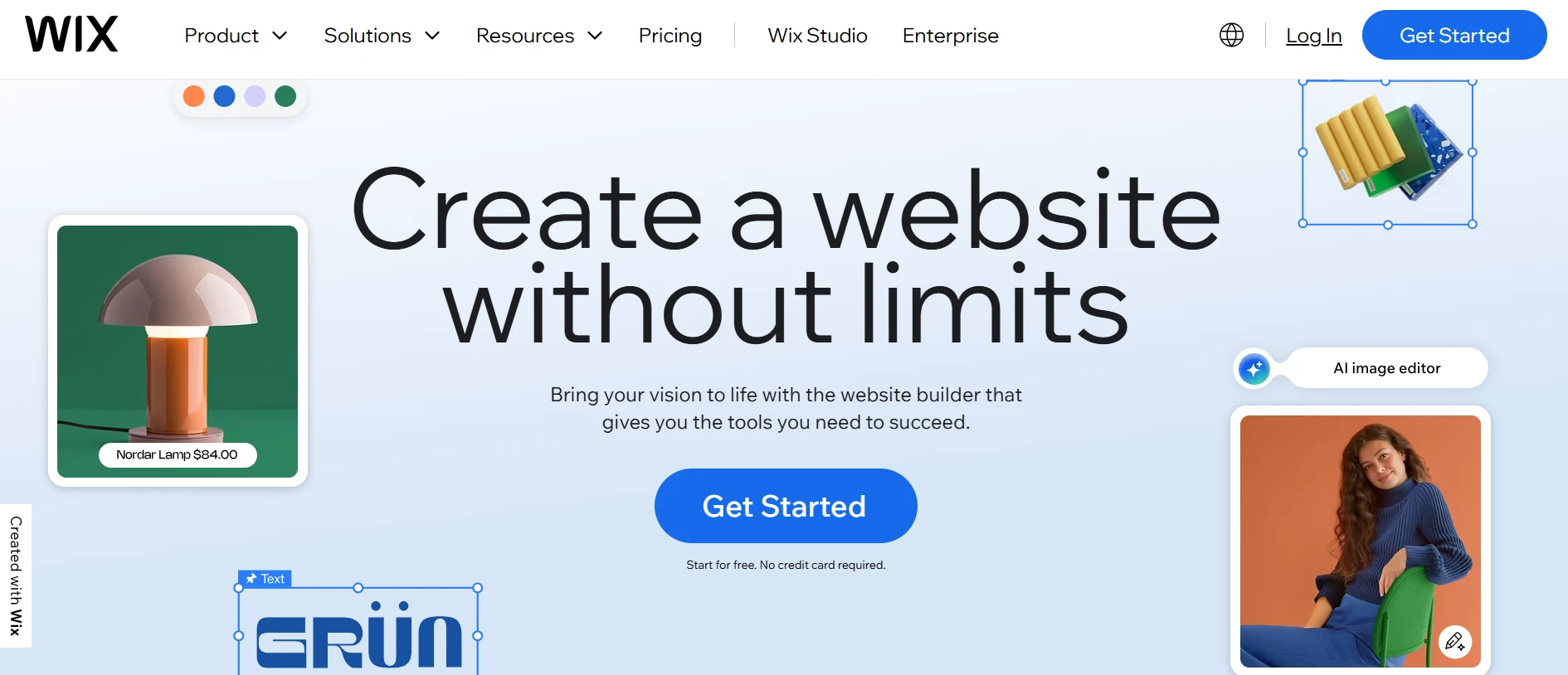
Wix is perfect for beginners who want a simple, drag-and-drop website that looks great and runs smoothly.
It’s flexible, giving you the freedom to design your site how you want. Whether you’re creating a blog, a product review site, or an eCommerce-focused affiliate site, Wix has the tools to make it happen.
Best For:
- Beginners: No coding, no headaches—just pick a template and start.
- Affiliate Bloggers: SEO tools help drive organic traffic to your content.
- E-commerce Affiliates: Built-in store features let you promote products with ease.
- Visual Creators: Highly customizable design options for unique branding.
Key Features:
- Drag-and-Drop Editor: No coding is needed. Move elements around, change colors, and tweak layouts easily.
- SEO Tools: Customize meta tags, image alt text, and URLs. Wix also offers a built-in SEO guide.
- Affiliate-Friendly Design: Add banners, CTA buttons, and affiliate links anywhere on your pages.
- Wix App Market: Access tools like Google Analytics, email marketing, and social media integrations.
- Mobile Optimization: Every Wix site is automatically responsive, ensuring a smooth mobile experience.
Pros & Cons:
| Pros | Cons |
|---|---|
| Extremely beginner-friendly | Free plan includes Wix-branded ads |
| Wide range of templates and design flexibility | No custom domain on the free plan |
| Built-in SEO tools | Limited storage (500MB on free plan) |
| App market adds extra features | E-commerce requires a paid plan |
| Mobile-friendly by default | Not ideal for complex, large-scale sites |
Free Plan Limitations:
- Included: Free hosting, Wix-branded subdomain (username.wixsite.com), templates, basic SEO tools, and design customization.
- Missing: Custom domain, full SEO control, premium apps, more storage, and ad removal.
Wix is a solid starting point if you want a beautiful, functional site without spending a dime. But as your affiliate site grows, upgrading to remove ads and improve SEO will be worth it.
Watch the Wix review in the video below:
2. WordPress.com
Affiliate marketing thrives on content. If you’re writing in-depth product reviews, SEO-driven blog posts, or niche guides, you need a platform that handles content well. That’s where WordPress.com stands out.
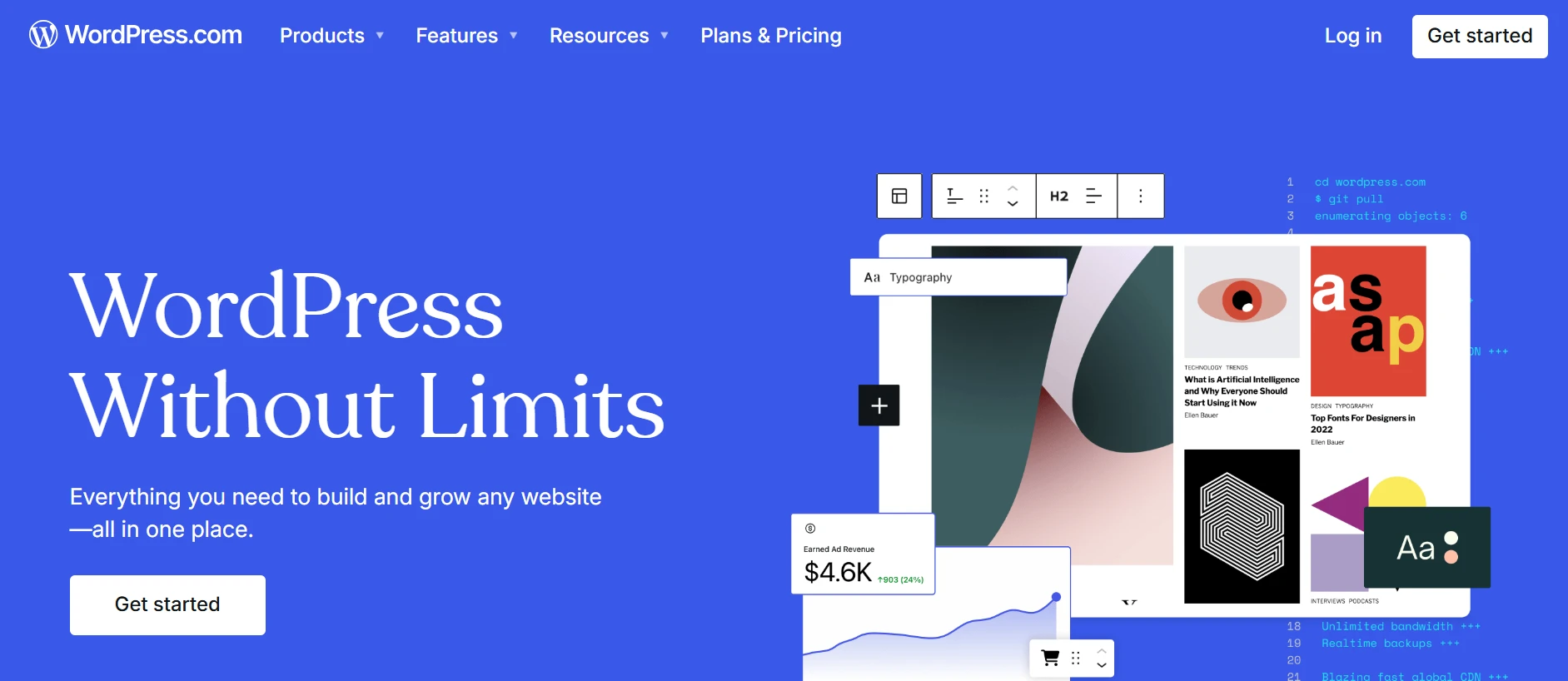
Unlike Wix, which focuses on drag-and-drop design, WordPress.com is built for content-first websites.
It’s one of the most SEO-friendly free website builders, making it a great choice if you want to drive organic traffic.
While it’s not as flexible as the self-hosted WordPress.org, it’s still a strong option for bloggers and content creators starting without upfront costs.
Best For:
- Bloggers & Content Creators – Ideal for long-form content and affiliate blogs.
- SEO-Focused Marketers – Strong built-in SEO tools help boost search rankings.
- Affiliate Review Sites – Easy to structure posts and add affiliate links.
- Writers Who Prioritize Simplicity – No coding required, just pick a theme and start writing.
Key Features:
- SEO-Optimized Structure – Clean code, mobile-friendly design, and fast loading speeds help with rankings.
- Content Management System (CMS) – Create, schedule, and organize blog posts effortlessly.
- Affiliate-Friendly Customization – Add call-to-action buttons, banners, and links within posts.
- Built-In Analytics – Track views, clicks, and engagement without third-party tools.
- Free Hosting & Security – WordPress.com manages hosting and updates, so you don’t have to.
Pros & Cons:
| Pros | Cons |
|---|---|
| Excellent for blogging and SEO | Free plan includes WordPress ads |
| Fast and mobile-friendly | No custom domain on free plan |
| Free themes for easy setup | Limited customization without paid upgrades |
| Strong content management tools | Cannot install third-party plugins on free plan |
| Automatic updates and security | Storage limit of 1GB on free plan |
Free Plan Limitations:
- Included: Free hosting, WordPress-branded subdomain (yourname.wordpress.com), basic SEO, built-in analytics, and free themes.
- Missing: Custom domain, full design flexibility, plugin support, advanced SEO controls, and ad removal.
If blogging is your main strategy, WordPress.com is one of the best free options. But as your site grows, you may need to upgrade for better SEO, customization, and monetization options.
3. GetResponse Website Builder
Affiliate marketing works best when you can capture leads and build trust. A website alone won’t do much—you need tools that turn visitors into subscribers and buyers.
GetResponse Website Builder is built for marketers who rely on email marketing, funnels, and automation to grow their income.
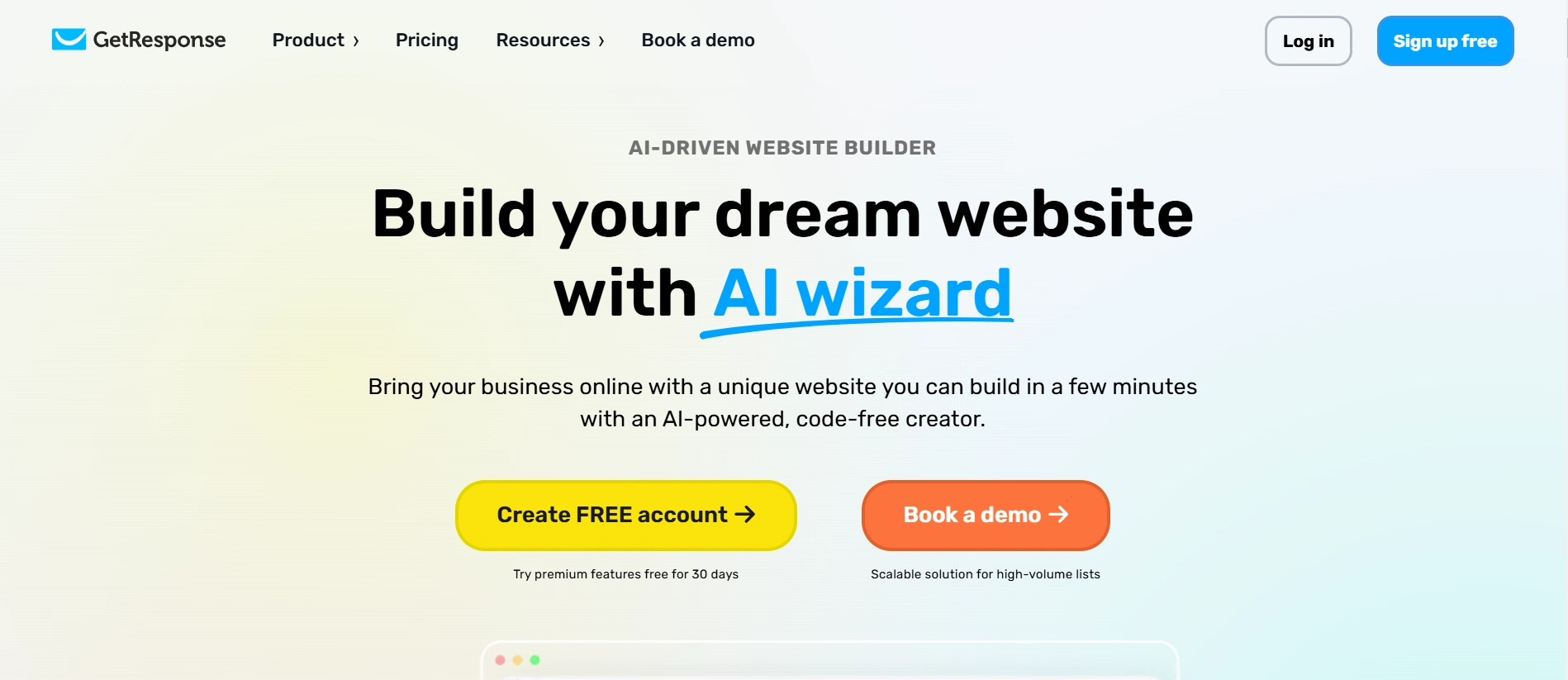
This platform makes it easy to create high-converting landing pages without coding. Plus, it connects directly with GetResponse’s email and automation tools, so you can nurture leads and increase commissions.
Best For
- Affiliate marketers using email and funnels because it connects seamlessly with automated email tools.
- Beginners who want AI assistance since the AI builder creates a website in minutes.
- Marketers focused on lead generation with built-in pop-ups, forms, and automation to capture leads.
- Anyone looking for an all-in-one tool that combines a website builder, email marketing, and sales funnels.
Key Features
- AI Website Builder that generates a complete site based on simple questions.
- Pre-Designed Sales Funnels to set up lead generation and product promotion pages.
- Email Marketing Integration that connects directly to automated sequences and campaigns.
- Affiliate-friendly customization with easy-to-add CTAs, banners, and product links.
- SEO & Mobile Optimization for fast load times and a smooth experience across devices.
Pros & Cons
| Pros | Cons |
|---|---|
| AI-assisted setup saves time | Fewer customization options than Wix or WordPress |
| Ideal for affiliate marketers using email funnels | Free plan has limited storage and features |
| All-in-one marketing solution with site, email, and automation | No custom domain on free plan |
| Easy to create high-converting landing pages | Not built for large content-heavy websites |
| Mobile-optimized and SEO-friendly | Fewer third-party integrations than WordPress |
Free Plan Limitations
- Included: AI-powered website builder, free hosting, basic landing pages, email marketing integration, and simple funnel creation.
- Missing: Custom domain, advanced automation, premium templates, and full analytics.
For affiliate marketers who prioritize lead generation and email marketing, GetResponse Website Builder is a practical choice.
It simplifies the process, helping you build an audience and drive conversions without extra tools.
4. Weebly
A simple website can be enough to start earning from affiliate marketing, and Weebly makes that process effortless. It’s designed for those who want a no-code, beginner-friendly platform that still offers monetization options.
Since it’s owned by Square, Weebly also has solid eCommerce capabilities, making it a good fit for affiliates promoting physical or digital products.
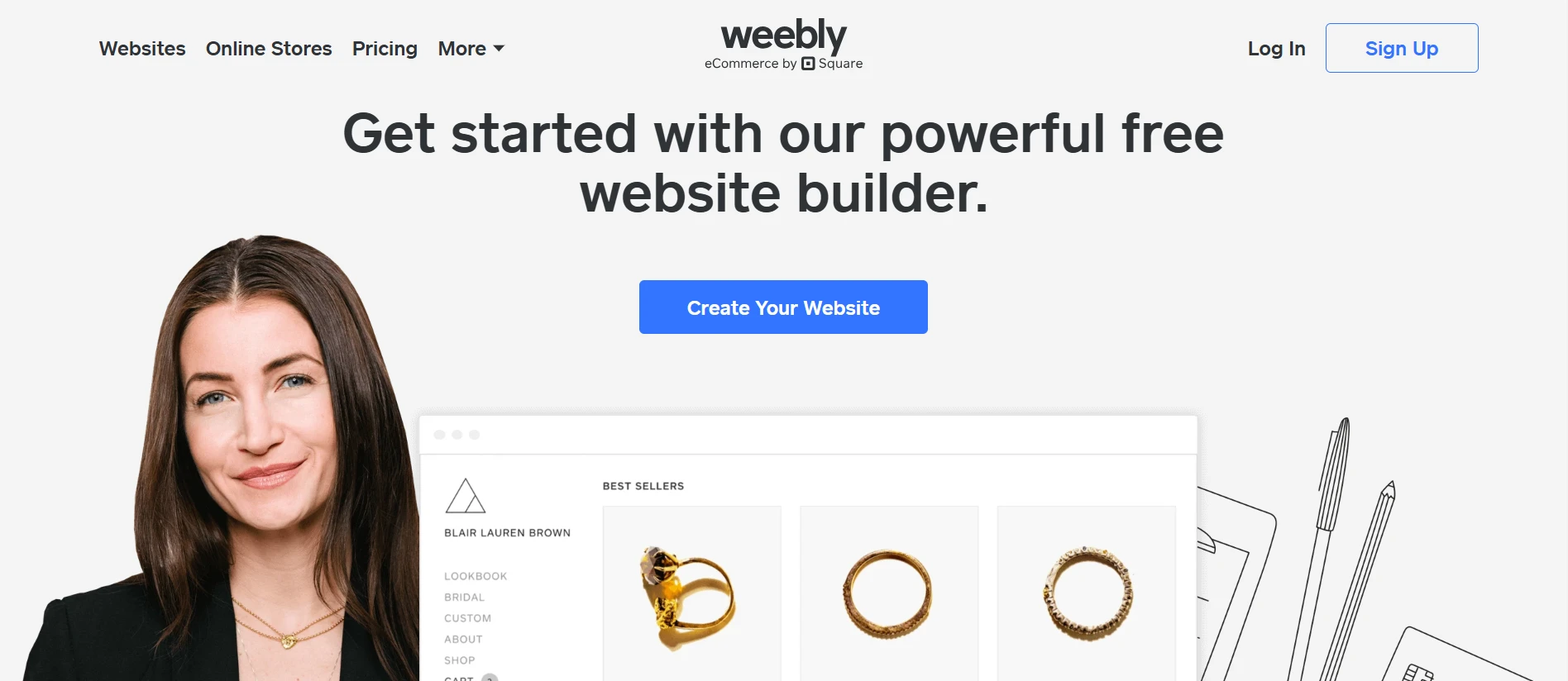
The platform is known for drag-and-drop simplicity, built-in SEO tools, and easy ad placements, making it a great choice for affiliates who want to focus on content and conversions rather than web development.
Best For
- Beginners who need a simple, no-code website with an intuitive drag-and-drop editor.
- Affiliate marketers who monetize with ads and product promotions thanks to built-in ad placement options.
- Small eCommerce affiliates since Square integration makes it easy to sell digital and physical products.
- Bloggers focused on SEO-friendly content with Weebly’s built-in on-page SEO tools.
Key Features
- Drag-and-Drop Website Builder that makes designing a site quick and easy.
- Built-in SEO Tools to help your affiliate site rank in search engines.
- Monetization Options with seamless ad placement and product sales.
- Mobile-Optimized Templates ensuring a great experience on all devices.
- App Store Integrations offering extra features like email marketing and analytics.
Pros & Cons
| Pros | Cons |
|---|---|
| Beginner-friendly with a simple drag-and-drop editor | Fewer customization options than WordPress |
| Free plan includes hosting and SEO tools | Limited design flexibility compared to Wix |
| Built-in eCommerce features for digital and physical products | Free sites show Weebly branding |
| Easy ad placement for affiliate monetization | No advanced marketing automation tools |
| Mobile-optimized templates | Fewer third-party app integrations |
Free Plan Limitations
- Included: Free hosting, SSL security, basic SEO tools, ad placements, and access to Weebly’s templates.
- Missing: Custom domain, advanced eCommerce tools, premium design templates, and marketing automation features.
For beginners and budget-conscious affiliate marketers, Weebly offers an easy-to-use platform that helps you build and monetize a site quickly.
You can also watch the Weebly review in the video below:
5. Shopify
Affiliate marketers in the eCommerce niche need a platform built for selling, and Shopify is the best in the business. Even if you don’t run your own store, Shopify makes it easy to promote products through affiliate links and create high-converting storefronts.

Its free trial gives new users a chance to test its sales-focused features, making it a smart choice for affiliates promoting dropshipping, print-on-demand, or direct eCommerce products.
Best For
- Affiliate marketers in the eCommerce niche since Shopify is optimized for product promotion.
- Dropshipping and print-on-demand affiliates because it integrates seamlessly with suppliers.
- Marketers who want an SEO-friendly storefront with built-in optimization tools.
- Beginners who need a structured, sales-focused website with easy product listings.
Key Features
- Built-in Storefronts designed to showcase products and boost conversions.
- Dropshipping & Print-on-Demand Support with apps like Oberlo and Printful.
- SEO & Marketing Tools to drive traffic and improve search rankings.
- Affiliate-Friendly Checkout that allows seamless referral tracking and commissions.
- Third-Party App Integrations offering email marketing, automation, and upsell options.
Pros & Cons
| Pros | Cons |
|---|---|
| Optimized for selling and affiliate eCommerce | Free trial is time-limited, not a forever free plan |
| SEO and marketing tools built-in | Requires a paid plan for a custom domain |
| Works well for dropshipping and print-on-demand | Transaction fees apply without Shopify Payments |
| Extensive app marketplace for added functionality | Not ideal for content-heavy affiliate sites |
| Secure, fast, and mobile-optimized | Limited customization on free trial |
Free Plan Limitations
- Included: Access to Shopify’s store builder, SEO tools, free themes, basic analytics, and product listing features.
- Missing: Custom domain, full storefront customization, abandoned cart recovery, and advanced marketing tools.
For affiliate marketers promoting eCommerce products, Shopify provides a professional, high-converting platform to turn traffic into sales.
6. Strikingly
Sometimes, a single-page website is all you need to convert visitors into affiliate sales. Strikingly specializes in one-page websites that load fast, look sharp, and focus attention on key offers.
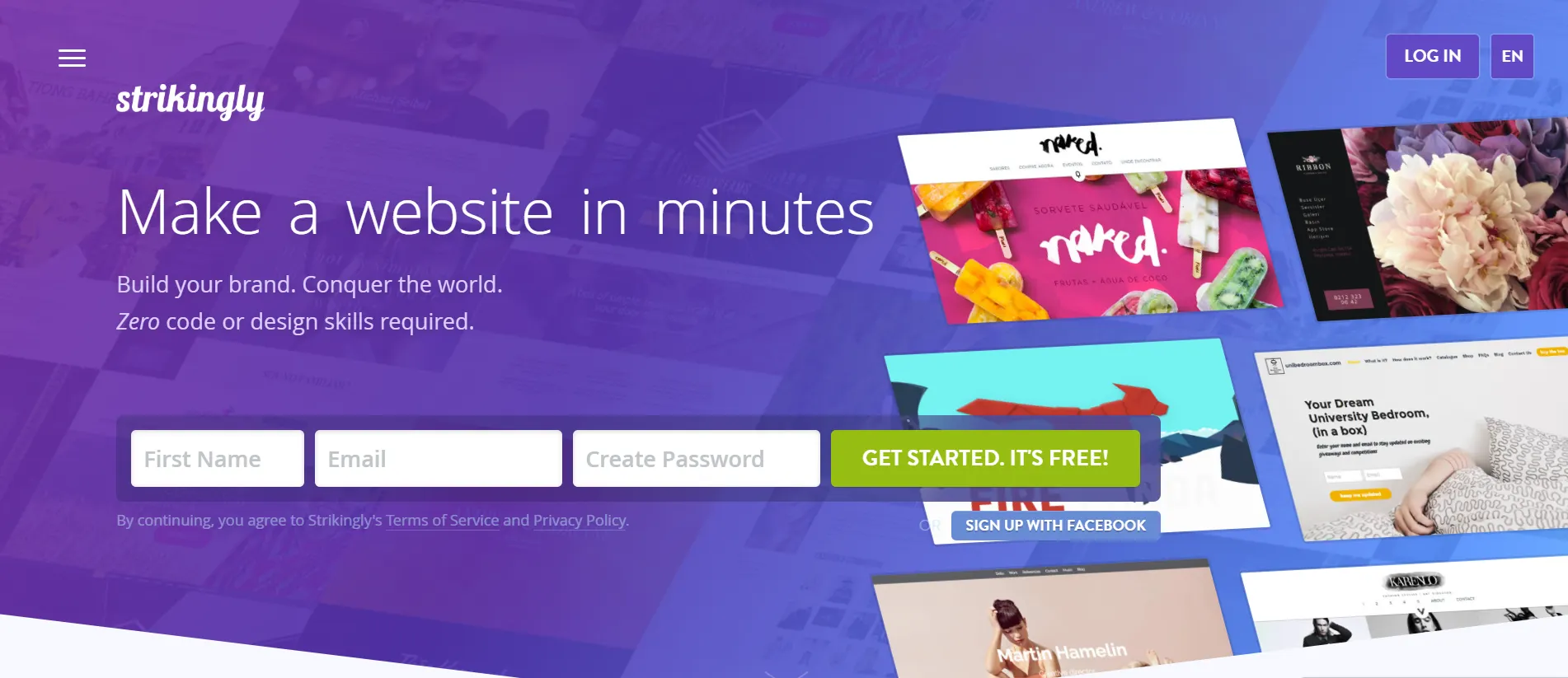
For affiliates who promote digital products, services, or lead magnets, Strikingly makes it easy to highlight one strong call to action without distractions.
Best For
- Marketers who need a high-converting landing page instead of a full website.
- Beginners who want a quick, no-code setup with minimal effort.
- Affiliates promoting digital products, services, or events with a single sales page.
- Mobile-focused marketers who need a site that looks great on any device.
Key Features
- One-Page Website Builder for focused, distraction-free affiliate promotions.
- Pre-Designed Templates that are mobile-optimized and easy to customize.
- SEO & Analytics Tools to track traffic and optimize for search engines.
- Simple eCommerce Integration allowing affiliates to sell digital products.
- Lead Capture Forms to collect emails and grow an audience.
Pros & Cons
| Pros | Cons |
|---|---|
| Fast and simple setup for single-page sites | Limited flexibility for multi-page websites |
| Free plan includes hosting and SSL security | Free sites display Strikingly branding |
| Mobile-optimized templates that look professional | SEO options are basic compared to WordPress |
| Great for affiliate landing pages and lead capture | eCommerce features are restricted on free plan |
| No coding required for customization | Not ideal for content-heavy affiliate sites |
Free Plan Limitations
- Included: Free hosting, one-page website, SSL security, basic analytics, and lead capture forms.
- Missing: Custom domain, advanced SEO tools, full eCommerce features, and multiple pages.
For affiliates who need a sleek, conversion-focused landing page, Strikingly is a quick and effective solution without the hassle of a full website.
7. Pineapple Website Builder
Creating a professional website can be daunting, especially without technical skills. Pineapple Builder simplifies this process by using AI to help you build a website quickly and efficiently. It’s designed for those who want to get online fast without compromising on quality.
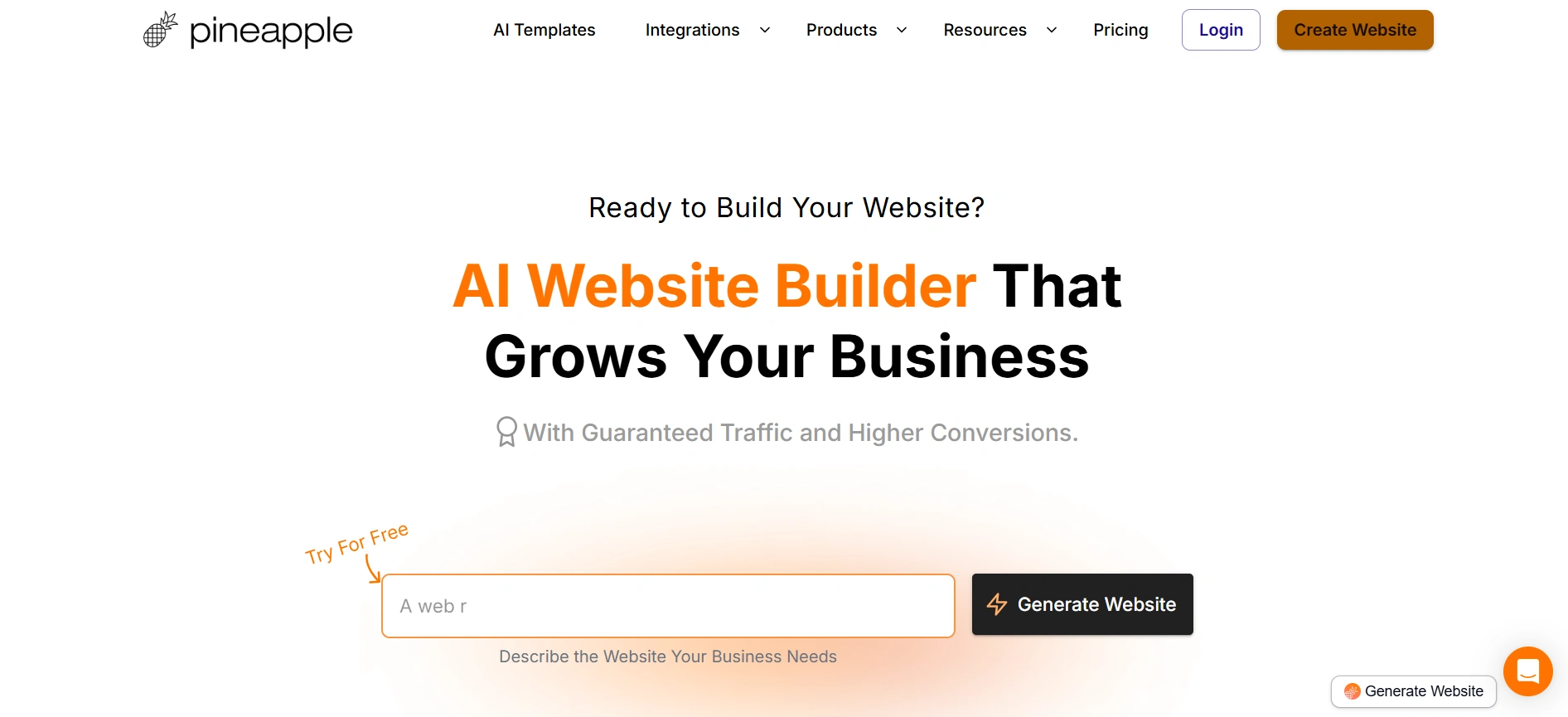
Best For
- Beginners seeking a quick, no-code website setup: Pineapple Builder’s AI-driven tools allow you to create a fully customized website in under 30 seconds.
- Businesses aiming for a global audience: With support for over 99 languages, it’s ideal for reaching customers worldwide.
- Users needing integrated AI tools for content creation and SEO: The platform offers AI-powered blogging and SEO features to enhance your online presence.
- Individuals or small businesses on a budget: Pineapple Builder provides a free plan, making it accessible for those with limited resources.
Key Features
- AI-Driven Website Creation: Generate a personalized website quickly by simply describing your business.
- Integrated Blogging Platform: Easily create and manage blog posts to engage your audience and improve SEO.
- SEO Optimization Tools: Built-in features help your site rank better in search engine results.
- Responsive Design Templates: Choose from a variety of templates that look great on all devices.
- 24/7 Customer Support: Access round-the-clock assistance to resolve issues promptly.
Pros & Cons
| Pros | Cons |
|---|---|
| Quick and easy setup with AI assistance | Advanced customization requires a paid plan |
| Supports over 99 languages for global reach | Free plan includes Pineapple Builder branding |
| Integrated SEO and blogging tools | Custom code addition available only on paid plans |
| Responsive design ensures compatibility across devices | Limited eCommerce features compared to specialized platforms |
| 24/7 customer support for continuous assistance | Some advanced features may have a learning curve |
Free Plan Limitations
The free plan includes hosting, SSL security, access to responsive design templates, and basic SEO tools.
However, it lacks features like custom domain support, advanced customization options, eCommerce capabilities, and the ability to add custom code.
Additionally, websites on the free plan will display Pineapple Builder branding.
For those starting out or operating on a tight budget, Pineapple Builder’s free plan offers essential tools to establish an online presence. As your needs grow, upgrading to a paid plan unlocks more advanced features and greater customization options.
8. Webnode
Reaching a global audience can give affiliate marketers a serious edge. But setting up a multilingual website often feels like a hassle—especially on free platforms. Webnode makes that process easier by offering built-in multilingual support without complicated plugins or extra tools.
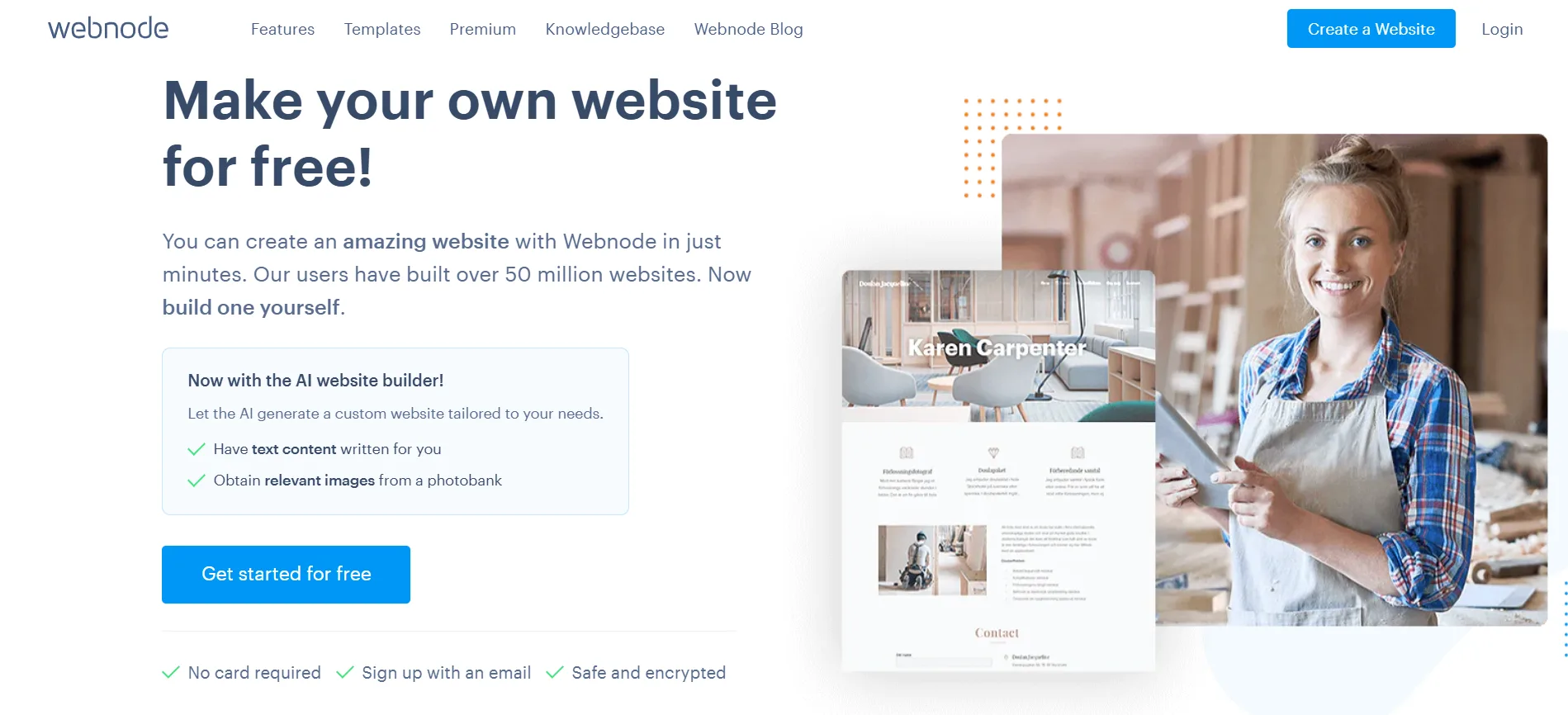
Webnode combines simplicity with flexibility, making it a great option for affiliate marketers who want to target audiences in different countries.
It doesn’t overwhelm you with too many technical options. Instead, it focuses on getting your website up fast while helping your content reach more people.
While Webnode doesn’t offer as many advanced features as WordPress, it covers the basics well—especially for content-driven sites and product promotions across different languages.
Best For
- Affiliate marketers targeting international audiences because it supports multiple languages out of the box.
- Beginners who want an easy website builder without dealing with code or technical tasks.
- SEO-focused affiliate sites with built-in optimization tools for better search rankings.
- Personal brands and small business affiliates who need a professional-looking website without too many complications.
Key Features
- Multilingual Website Support that lets you create content in different languages easily.
- Drag-and-Drop Editor that makes building your site simple without coding.
- Basic SEO Tools to optimize titles, meta descriptions, and URLs for search engines.
- Responsive Design Templates that automatically adjust to mobile, tablet, and desktop screens.
- Custom Domain Connection on paid plans to build your brand without a subdomain.
Pros & Cons
| Pros | Cons |
|---|---|
| Easy to create multilingual websites | Free plan shows Webnode branding |
| Beginner-friendly editor | Limited customization options |
| SEO-friendly features included | No eCommerce on the free plan |
| Mobile-responsive templates | Small storage limit on the free plan |
| Fast setup process | Fewer third-party integrations than other platforms |
Free Plan Limitations
- Included: Free hosting, multilingual support, drag-and-drop editor, and basic SEO features.
- Missing: Custom domain, eCommerce features, advanced SEO tools, and larger storage capacity.
Webnode works best for affiliate marketers who want to reach international audiences without technical headaches.
If you’re building a simple content site with global reach, Webnode’s free plan can get you started—but upgrading will unlock more customization and eCommerce options.
9. Google Sites
Sometimes, you just need a quick, no-hassle website. No complex setups. No hidden fees. Just a simple page to share content and links. That’s exactly what Google Sites offers.
It’s not the most advanced website builder, but it gets the job done for affiliate marketers who want a basic, ad-free site without spending a dime.
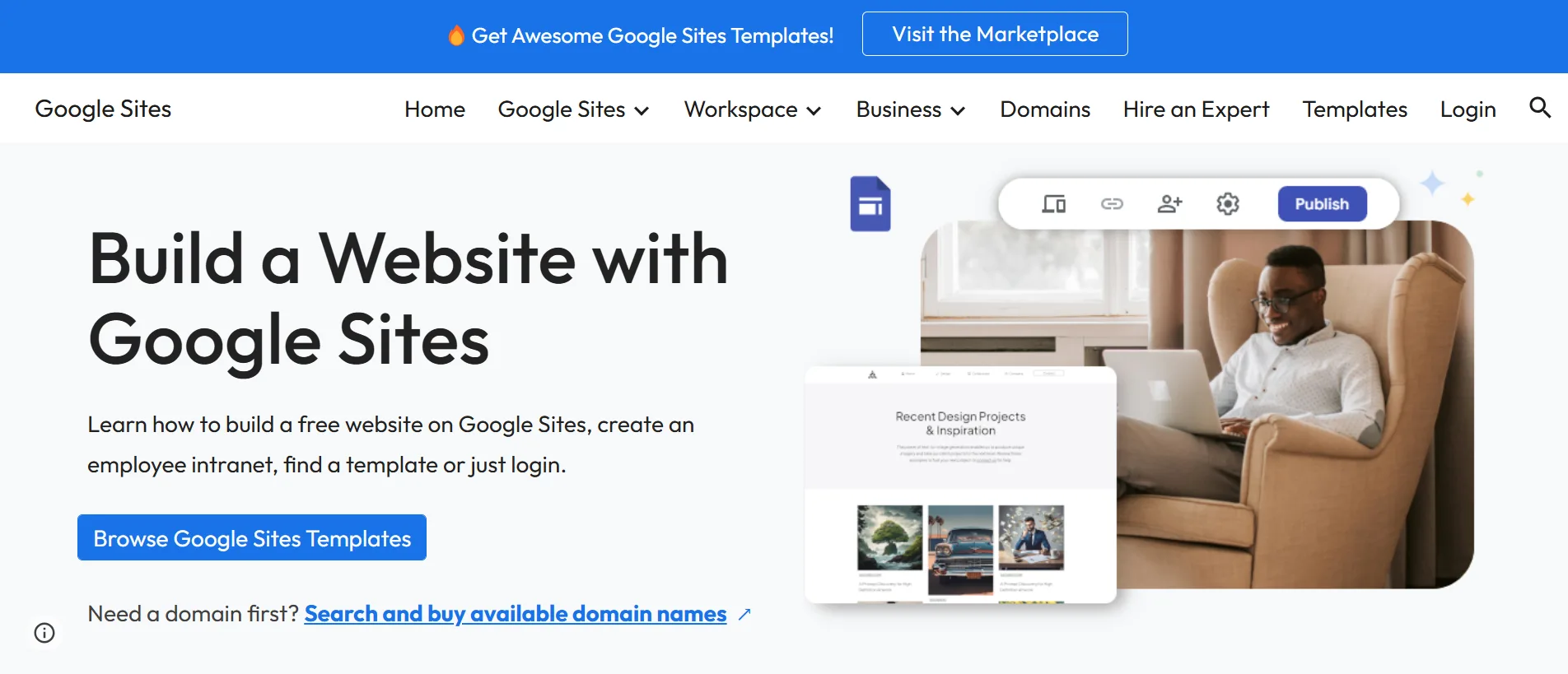
If your goal is to create a quick landing page, a content hub, or a resource site for affiliate links, Google Sites is a solid option.
It’s completely free, works seamlessly with other Google tools, and doesn’t force ads on your site like some other free builders.
Best For
- Beginners who need a free and simple website with zero technical skills required.
- Affiliate marketers who want a quick landing page for promotions or lead generation.
- Google Workspace users who want easy integration with Google Drive, Docs, and Forms.
- Marketers looking for an ad-free, no-cost solution without branding from the provider.
Key Features
- Completely Free with no forced ads or branding.
- Drag-and-Drop Editor makes it simple to build and customize pages.
- Google Workspace Integration connects with Docs, Sheets, Forms, and other tools.
- Mobile-Friendly Design ensures your site looks good on any device.
- Custom Domain Support allows you to connect your own domain (requires Google Domains).
Pros & Cons
| Pros | Cons |
|---|---|
| 100% free with no forced ads | Limited customization options |
| Easy to use with drag-and-drop editing | No built-in SEO tools for optimization |
| Works seamlessly with Google apps | No direct eCommerce features |
| Mobile-friendly and responsive | Fewer third-party integrations compared to other builders |
| Can connect a custom domain | Basic templates that may not look as professional as other builders |
Free Plan Limitations
- Included: Free hosting, ad-free experience, custom domain support, full access to Google integrations.
- Missing: Advanced SEO tools, deep customization options, eCommerce capabilities, and third-party app integrations.
Google Sites works best for affiliate marketers who need a simple, no-cost website without distractions. If you want more flexibility, SEO control, or monetization options, you may outgrow it fast.
But if you just need a clean, quick site for affiliate links or content, it’s one of the easiest free options available.
10. Jimdo
Some website builders try to do everything, but Jimdo focuses on simplicity and speed—perfect for affiliate marketers who want to launch a site with minimal effort.
With its AI-powered builder, you can get a website up and running in minutes without touching a single line of code.
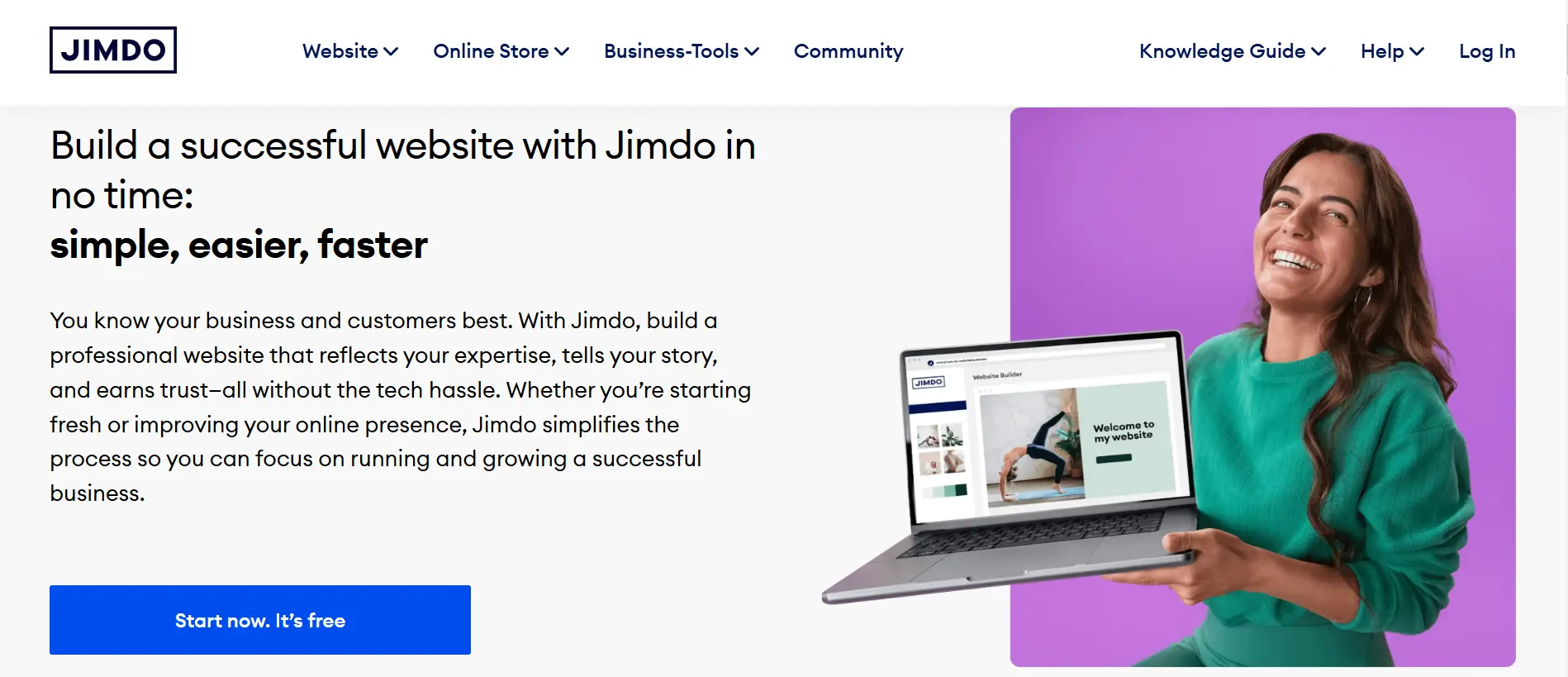
It’s designed for small businesses and personal websites, but affiliate marketers can also benefit from its clean design, mobile responsiveness, and ease of use. If you’re looking for a no-fuss way to build a site, Jimdo might be the answer.
Best For
- Beginners who want an AI-powered, no-code website builder with minimal setup.
- Affiliate marketers who need a quick, professional-looking site without technical headaches.
- Freelancers or small business owners who want an online presence with built-in branding tools.
- Marketers who prefer a clean, mobile-friendly design optimized for any device.
Key Features
- AI Website Builder that auto-generates a website based on your preferences.
- Drag-and-Drop Editor for easy customization.
- Mobile-Optimized Designs that ensure your site looks great on any screen.
- Free Domain & Hosting included in the free plan (with a Jimdo subdomain).
- SEO & Analytics Tools to help track performance and improve rankings.
Pros & Cons
| Pros | Cons |
|---|---|
| AI-powered setup makes it fast and easy | Free plan forces a Jimdo-branded domain |
| Mobile-optimized templates | Limited customization compared to other builders |
| Built-in SEO tools and analytics | No eCommerce features on the free plan |
| Free hosting included | Lacks advanced affiliate-friendly features like ad management |
| GDPR-compliant (ideal for European users) | Fewer third-party integrations |
Free Plan Limitations
- Included: AI-powered website creation, free Jimdo subdomain, mobile optimization, SEO tools, basic analytics.
- Missing: Custom domain, advanced SEO controls, monetization features, and full design flexibility.
Jimdo works best for affiliates who want a hassle-free, professional-looking website without spending hours building it.
The AI builder is a time-saver, but if you need full control over design, monetization, or integrations, other builders may be a better fit.
11. SITE123
Building a website can feel overwhelming, but SITE123 makes it as simple as it gets. This builder is designed for speed and ease, perfect for affiliate marketers who want to get online fast.
You don’t need to mess with complex settings or coding—just pick a template, add content, and publish.
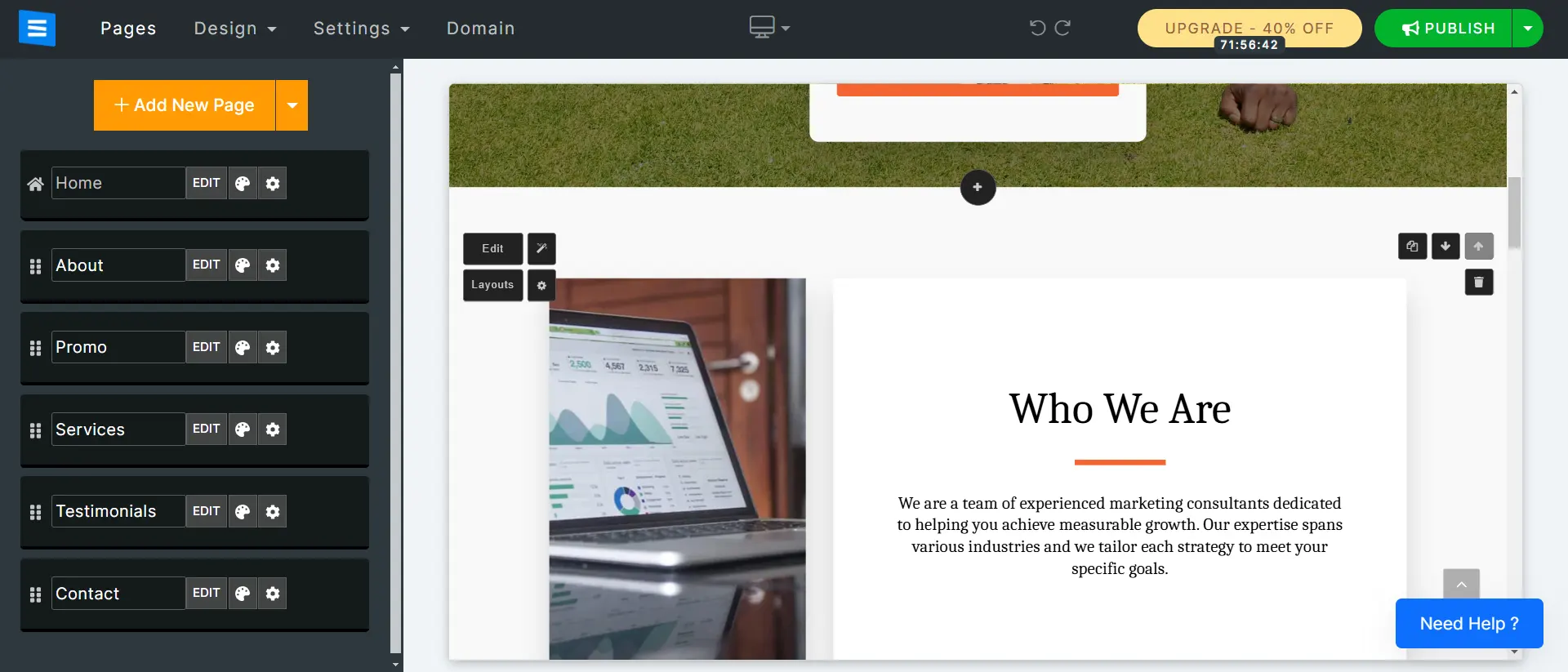
It’s not the most customizable platform, but it’s great for beginners who need a basic, functional site without a steep learning curve.
If you want to launch a clean, ad-free affiliate website with minimal effort, SITE123 is worth considering.
Best For
- Beginners who want a simple, no-fuss website builder.
- Affiliate marketers who need a fast setup without dealing with code.
- Users who prefer a guided, step-by-step site creation process.
- Marketers who need free hosting and basic SEO tools.
Key Features
- Quick Setup with pre-designed layouts and step-by-step guidance.
- Drag-and-Drop Editor for simple customization.
- Mobile-Responsive Design ensures your site looks good on all devices.
- Basic SEO Tools help optimize your site for search engines.
- Free Hosting & SSL included with the free plan.
Pros & Cons
| Pros | Cons |
|---|---|
| Very beginner-friendly with step-by-step guidance | Free plan forces SITE123 branding |
| Mobile-optimized designs | Limited customization options |
| Built-in SEO features | No eCommerce on the free plan |
| Free hosting and SSL included | Custom domain requires an upgrade |
| Fast website setup in minutes | Fewer integrations with third-party tools |
Free Plan Limitations
- Included: Free SITE123 subdomain, mobile-friendly templates, basic SEO tools, free hosting, and SSL.
- Missing: Custom domain, full design flexibility, eCommerce features, and advanced marketing tools.
SITE123 works best for affiliate marketers who want a quick, straightforward website without getting into technical details.
If you need more control over customization or advanced monetization features, you may outgrow the free plan quickly.
Here’s a clear, easy-to-scan comparison table to help you quickly compare the best free website builders for affiliate marketing.
Best Free Website Builders at a Glance
| Website Builder | Best For | Ease of Use | Customization | SEO Features | Affiliate-Friendly | Free Plan Limitations |
|---|---|---|---|---|---|---|
| Wix | Beginners, drag-and-drop design | ⭐⭐⭐⭐⭐ | ⭐⭐⭐⭐ | ⭐⭐⭐⭐ | ⭐⭐⭐ | Wix ads, no custom domain |
| WordPress.com | Blogging, SEO-focused content | ⭐⭐⭐ | ⭐⭐⭐⭐ | ⭐⭐⭐⭐⭐ | ⭐⭐⭐ | WordPress ads, limited plugins |
| GetResponse Website Builder | Email marketing, funnels | ⭐⭐⭐⭐ | ⭐⭐⭐ | ⭐⭐⭐ | ⭐⭐⭐⭐⭐ | Limited templates, subdomain only |
| Weebly | No-code websites, eCommerce | ⭐⭐⭐⭐⭐ | ⭐⭐⭐ | ⭐⭐⭐ | ⭐⭐⭐ | Square ads, no custom domain |
| Shopify (Free Trial) | eCommerce affiliates | ⭐⭐⭐⭐ | ⭐⭐⭐⭐ | ⭐⭐⭐⭐ | ⭐⭐⭐⭐⭐ | Free trial only, no free plan |
| Strikingly | Single-page affiliate sites | ⭐⭐⭐⭐⭐ | ⭐⭐⭐ | ⭐⭐⭐ | ⭐⭐⭐ | Strikingly branding, limited pages |
| Webnode | Multilingual affiliate sites | ⭐⭐⭐⭐ | ⭐⭐⭐⭐ | ⭐⭐⭐ | ⭐⭐⭐ | Webnode ads, limited features |
| Google Sites | Quick, simple websites | ⭐⭐⭐⭐⭐ | ⭐⭐⭐ | ⭐⭐⭐ | ⭐⭐ | No custom domain, basic SEO |
| Jimdo | AI-powered site creation | ⭐⭐⭐⭐⭐ | ⭐⭐⭐ | ⭐⭐⭐ | ⭐⭐⭐ | Jimdo branding, limited eCommerce |
| SITE123 | Fast setup, free hosting | ⭐⭐⭐⭐⭐ | ⭐⭐⭐ | ⭐⭐⭐ | ⭐⭐ | SITE123 branding, limited flexibility |
Key Takeaways:
- For complete beginners → Wix, Weebly, SITE123, or Jimdo.
- For SEO and blogging → WordPress.com or Webnode.
- For email marketing & funnels → GetResponse Website Builder.
- For eCommerce affiliates → Shopify (with a free trial) or Weebly.
- For quick, simple sites → Google Sites or Strikingly.
Pick the builder that fits your needs and budget. If you need advanced features, consider upgrading to a paid plan for more flexibility and branding control.
How to Choose the Best Free Website Builder for Your Affiliate Marketing Needs
Not all website builders work the same way. Some are great for beginners, while others offer better SEO tools or support for eCommerce.
Choosing the right one depends on how you plan to grow your affiliate business. Here’s how to make the best choice:
Beginners: Go for Easy Setup and Drag-and-Drop Builders
If you’re just starting, the last thing you need is complicated coding or endless setup steps. You need a builder that lets you drag, drop, and publish without frustration.
Best options: Wix, Weebly, SITE123, Jimdo
- These builders keep things simple with pre-designed templates, intuitive editors, and guided setups.
- No technical skills required—just add your content, affiliate links, and hit publish.
- Wix and Weebly allow more customization without overwhelming you.
SEO-Focused Affiliates: Prioritize Advanced Blogging and SEO Plugins
Organic traffic is a goldmine for affiliate marketers. A website builder with strong SEO tools can help your content rank higher on Google. Look for:
Best options: WordPress.com, Webnode
- WordPress.com is the top choice for bloggers with built-in SEO tools and structured content formatting.
- Webnode supports multilingual content, great for affiliates targeting multiple countries.
- Features like meta tags, alt text, fast-loading pages, and mobile responsiveness make a big difference.
E-commerce Affiliates: Focus on Storefronts and Dropshipping Support
If you’re promoting physical or digital products, you need a builder that supports storefronts, product pages, and seamless checkout integration. Look for:
Best options: Shopify (Free Trial), Weebly
- Shopify is the best for serious eCommerce affiliates, especially with its dropshipping and multi-channel selling features.
- Weebly works well for smaller stores with built-in Square payment integration.
- Both offer simple product page designs, affiliate-friendly sales tracking, and mobile-optimized layouts.
Scalability Needs: When to Upgrade from Free to Paid
A free plan can help you start, but at some point, you may need a custom domain, better branding, or advanced marketing tools. Signs you’re ready to upgrade:
- You’re driving consistent traffic. A branded domain (e.g., yoursite.com) builds credibility.
- You need better SEO tools. Paid plans often unlock full SEO controls, analytics, and faster loading speeds.
- You want to remove ads. Free plans often place unwanted branding on your site.
- You need integrations. Paid plans support email marketing, payment gateways, and premium design options.
Best platforms for growth: WordPress.com (for content creators), Shopify (for eCommerce affiliates), Wix (for all-around flexibility).
Summary
Your website builder should match your goals, experience level, and long-term vision. If you’re just getting started, pick an easy-to-use builder.
If SEO is your priority, go for a content-friendly platform. If you’re selling products, choose a builder with eCommerce features. And if you’re serious about scaling, be ready to upgrade when free plans hold you back.
Conclusion
Your website is your digital storefront, and the right builder makes all the difference. A free platform lets you start with minimal risk, but the real power comes from how you use it.
Whether you focus on blogging, SEO, eCommerce, or simple landing pages, your success depends on consistent effort and smart strategy.
No tool is perfect, but the best one is the one that gets you online and earning. Take action, test different features, and adapt as you grow. The key isn’t just choosing a builder—it’s building something that works for you.
The most important thing? Get started. Don’t get stuck overthinking. Pick a builder, set up your site, and start promoting your offers. The sooner you take action, the sooner you’ll see results.
Frequently Asked Question
Can I really build a successful affiliate marketing site with a free website builder?
Yes, but expect limitations. Free plans often have subdomains, ads, and fewer customization options. They’re great for starting out, but upgrading later can help with branding, SEO, and conversions.
Which free website builder is best for SEO?
WordPress.com and Webnode offer the best built-in SEO features. Wix and Weebly also have solid SEO tools, but WordPress gives you more flexibility with content and keyword optimization.
Can I monetize my site with a free plan?
Most free plans allow affiliate links, but some restrict ad placements and third-party monetization. Shopify and Weebly support product promotions, while Google Sites is more limited. Always check the platform’s terms.
How do I add affiliate links to my website?
Most builders let you insert links directly into blog posts, buttons, or banners. If you need tracking tools or advanced link management, look for platforms with integration options or upgrade to a paid plan.
What’s the main drawback of using a free website builder?
Limited customization, branding restrictions, and possible platform ads. Free plans often lack custom domains, advanced SEO tools, and eCommerce features, which can impact credibility and growth.
When should I upgrade to a paid plan?
If you’re getting traffic, making commissions, or need more control over design and branding, it’s time to upgrade. A custom domain and premium features can improve trust, SEO, and conversions.


What i do not realize is in fact how you are no longer actually much more well-favored than you might be right now. You’re very intelligent. You recognize thus considerably in relation to this topic, made me in my view believe it from numerous numerous angles. Its like men and women are not fascinated until it is one thing to do with Lady gaga! Your own stuffs excellent. All the time handle it up!